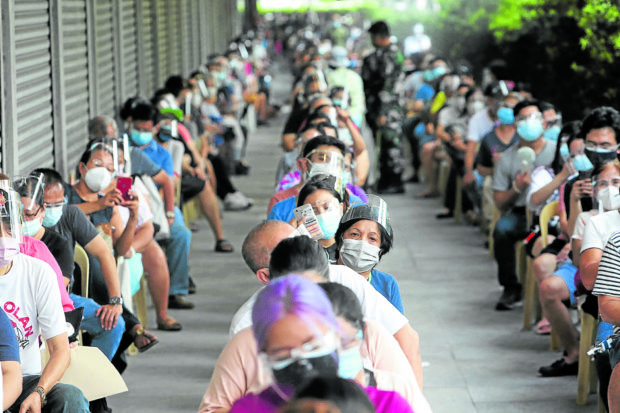
FILE PHOTO: Vaccination sites offering the US-made Pfizer jabs are drawing large crowds, such as this one outside the Prince Hotel in Ermita, Manila. Authorities have warned against potential superspreader events as the government ramps up the rollout of vaccines. INQUIRER file photo / MARIANNE BERMUDEZ
MANILA, Philippines — Sixty-eight percent of Filipinos say they have “easy access” to COVID-19 vaccination sites while 50 percent think there is “slow” progress in the country’s vaccination program.
These were the results of the recent Social Weather Stations (SWS) survey on the country’s vaccination program against the SARS-CoV-2 coronavirus that causes the serious respiratory illness COVID-19.
Of the 68%, the SWS survey noted that 54% of them have “very easy” while 14% have “somewhat easy” access to coronavirus jab centers.
On the other hand, the polls found that 29% say “they have no access at all” to coronavirus jab centers and that 3% reveal “they have access but difficult.”
According to SWS, those with “easy access” to COVID-19 vaccination sites are higher in Metro Manila and “among the more educated groups.”
It said that 83 percent in Metro Manila have easy access to inoculations areas while 71 percent, 67 percent, and 62 percent report a similar situation in Mindanao, Visayas, and Balance Luzon, respectively.
Those who say they do not have access to vaccination centers are highest in Balance Luzon at 35 percent, followed by the Visayas at 29 percent, Mindanao at 26 percent, and Metro Manila at 16 percent.
In terms of education, SWS said college graduates have easier access to jab hubs at 75 percent; junior high school graduates, 67 percent; elementary graduates, 71 percent; and non-elementary graduates, 53 percent.
Forty-three percent of non-elementary graduates who participated in the survey claim not having any access to COVID-19 vaccination sites; 27 percent, elementary graduates; 29 percent, junior high school graduates; and 23 percent, college graduates.
Meanwhile, complaints on the slow progress of the country’s vaccination rollout against COVID-19 are more frequent among individuals who either have difficulty or no access to an inoculation center.
SWS said: “The survey also found that the pace of vaccination is considered ‘slow’ by 51% for their own barangay, 44% for their own city/municipality, and 50% for the Philippines.”
The poll results likewise showed that 64 percent among those with difficult access to vaccination sites and 50 percent of those with no access also say that the vaccination progress in the country is “slow.” Only 47 percent of those with easy access have shared a similar complaint.
According to SWS, most of the complaints come from Metro Manila where 57 percent think that the current vaccination progress is slow, trailed by Balance Luzon at 55 percent, Visayas at 51 percent, and Mindanao at 33 percent.
On the other hand, the majority of those who say that the vaccination drive’s current pace “is alright” are from Mindanao at 63 percent, followed by Visayas at 44 percent, and only 38 percent at both Balance Luzon and Metro Manila.
SWS noted that those who complain about the country’s slow vaccination progress are more prevalent among elementary graduates and above, ranging from 49 to 55 percent, compared to non-elementary graduates at 37 percent; while those who say they are satisfied with the current speed of vaccinations are slightly more common among non-elementary graduates at 51 percent than among elementary graduates and above at 43 percent to 46 percent.
The Second Quarter 2021 Social Weather Survey was conducted on June 23–26, 2021, involving 1,200 respondents aged 18 and above — 300 each in Metro Manila, Balance Luzon, the Visayas, and Mindanao. Its sampling error margins are ±3% for national percentages and ±6% for Metro Manila, Balance Luzon, the Visayas, and Mindanao.
COVID-19 infections continue to soar nationwide, as the more transmissible Delta variant appears to become more widespread in the Philippines. In a bid to control the transmission of the Delta variant which could lead to a possible surge, the government decided to reimpose a hard lockdown on Metro Manila, as well as other provinces.
Vaccination drives, however, would continue despite the enhanced community quarantine – the strictest quarantine mode devised by the government since the COVID-19 pandemic hit the country in 2020.
As of August 17, the country’s total coronavirus infections reached 1,765,675. This includes 105,787 active cases and 30,462 deaths.
RELATED STORY
More Filipinos willing to get COVID-19 vaccine, latest SWS survey shows